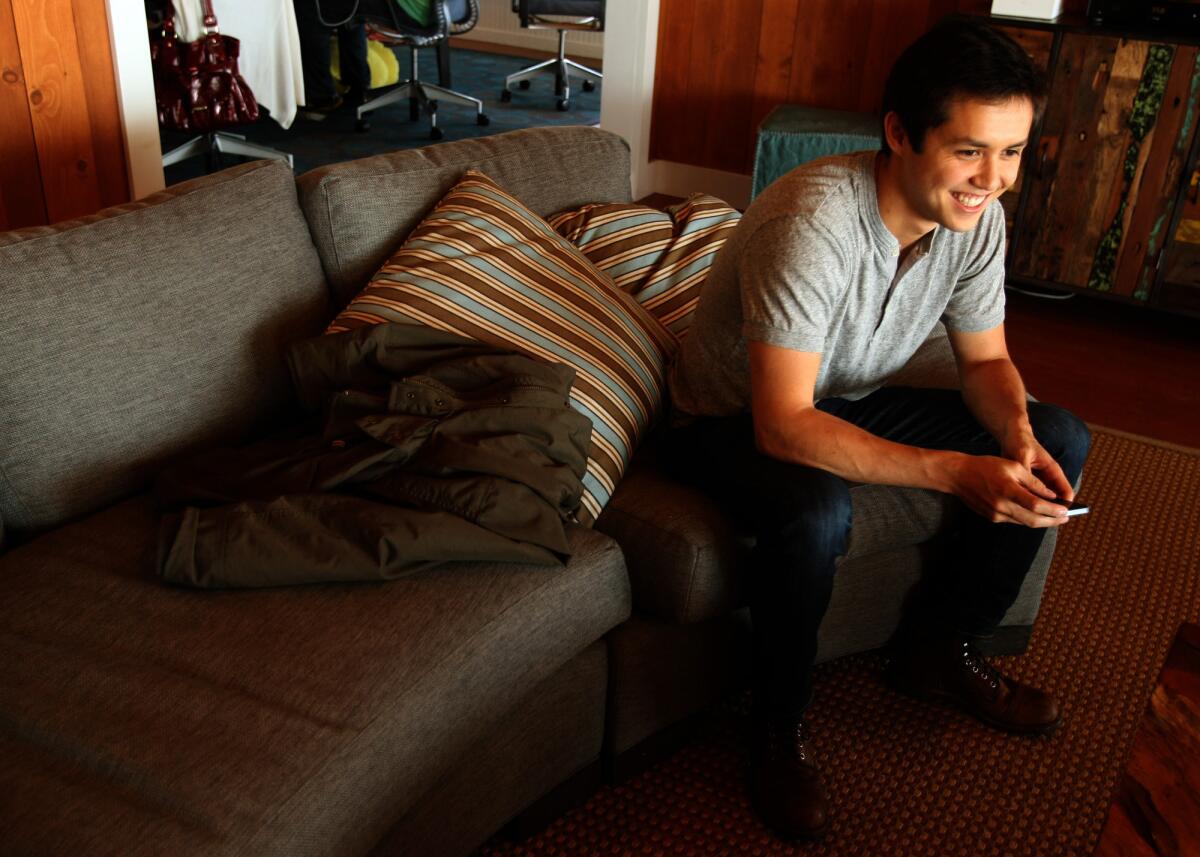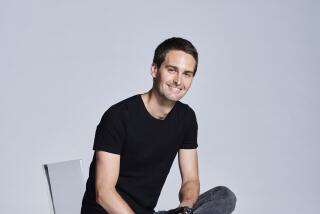Bobby Murphy cleaned up after frat parties; now he stands to clean up in Snapchat IPO

- Share via
The head of a security team Evan Spiegel hired to police his high school house parties imparted on him an important lesson: Your true friends are those who stay behind to help you clean up afterward.
The advice stayed with him at Stanford University, where frat mate Bobby Murphy stuck around late at night to tidy up after parties that Spiegel arranged.
Spiegel and Murphy went on to spend countless long nights together not only as trusted friends but also as business partners willing to pursue the other’s wild ideas. Murphy invited Spiegel’s help on a social networking service. Spiegel sought out Murphy to develop a college admissions tool. Though the efforts were among many that failed, their relationship remained close.
Now, Spiegel, 26, and Murphy, 28, are the best friends and co-creators leading Snapchat, one of the world’s most-used smartphone apps, into a new chapter.
Spiegel is the face of Snap Inc., the jet-setting, supermodel-dating, trend-making, once-in-a-generation technology chief executive who has more patents to his name than his co-founder.
Relative to Spiegel, Murphy is an unknown entity publicly. He’s rarely seen or heard from outside the research and development teams he leads as chief technology officer. The few people willing to discuss him describe him as quiet, unpretentious and stoic.
“Very chill. Very friendly. Real good guy,” said Garrett Gee, who sold his digital barcode start-up Scan Inc. to Snap in 2014.
On paper, Spiegel and Murphy are equally influential. Heading into Snap’s expected debut on the public stock market Thursday, the pair hold equal voting power and ownership of their business. Spiegel’s stake will climb after the initial public offering, but either can retain power even after leaving the company. If one dies, then the other could control the $20-billion company.
Potential investors say uncertainty about Murphy’s role and perspectives wouldn’t stop them from buying Snap shares. That decision instead will primarily rest on whether they expect Snapchat to gain users at a fast pace for years to come. They say it’s commonplace for tech companies to revolve around dual personalities, including Apple’s showman Steve Jobs and Yahoo’s cheerleader Jerry Yang compared with their more private co-founders Steve Wozniak and David Filo.
“It’s often a case where the other person appreciates the fact that they can be unknown, stay behind the scenes and walk around without being noticed,” said Ryan Jacob, whose Jacob Asset Management manages a fund of Internet stocks. “Some can’t believe it, but believe me, there’s a lot of people who enjoy that.”
Concerns could arise, though, if Spiegel and Murphy disagree about how the company should be run. They’ve never had a public spat, but that doesn’t mean investors aren’t questioning how they will overcome tensions.
Investors can draw inferences from the executives’ pre-IPO video pitch (which features Spiegel for about three times as long). Murphy talks about the “brilliance of Evan” and his ability to develop services that delight users. And Spiegel promotes the idea that Murphy has been prescient, crediting him for realizing Snapchat’s potential to be more than a photo-messaging app.
The two, who met when Spiegel was a freshman at Stanford, continue to sit by each other for big moments, including a meeting with Facebook CEO Mark Zuckerberg, an appearance on “The Colbert Report” and key product launches.
Chuck Eesley, who taught Murphy at Stanford’s engineering school in 2010, said the unique thing about the role of the understated technical leader is that technologists who successfully partner with a business or design leader are a rare breed.
“There’s a lot of technical-heavy teams where no one wants to work with the talker, the seller … the loudest guy in the loudest bar,” said Eesley, who studies entrepreneurship. “But a lot of the research shows you need that combination of skills.”
Murphy grew up in El Cerrito, Calif., attending private Catholic schools in nearby Berkeley.
His parents served as state bureaucrats, his father for the Board of Equalization and his mother for the State Compensation Insurance Fund.
At Stanford, Eesley recalls Murphy’s team proposing a sort of Yelp for clubs that would rank the campus’ student organizations. But entrepreneurs, investors and alumni serving as early judges weren’t impressed with its money-making potential.
Murphy’s group hurriedly changed course. They put together an idea for an electronic medical records program. By the next presentation, they had a customer who was willing to spend thousands of dollars on the service.
“That was quite impressive to everyone,” Eesley said, noting that most teams refuse to budge from their original idea let alone successfully transition to another one.
Murphy exuded a quiet confidence throughout the project, and he was the type of student who wanted to work on something meaningful beyond big profits and valuations, Eesley said.
“To him, Snapchat was the vision for an artistic project, and definitely in class he had this idea he wanted to work on something that was going to challenge him,” he said.
Through Snap, Murphy has declined interview requests over the last year.
He left Stanford a year before Spiegel with a bachelor’s degree in mathematical and computational science. Though work on Snapchat was underway, Murphy got a day job at Revel Systems in San Francisco. The 40-employee start-up was building restaurant management software, including iPad registers.
Functionality that Murphy programmed continues to be used by Revel, including for allowing full-service restaurants to change the digital layout of tables.
Christopher Ciabarra, a Revel co-founder, recalled Murphy being a speedy software programmer who kept to himself but enjoyed having a laugh with colleagues.
He’s a “well-rounded gentlemen,” Ciabarra said.
Ciabarra gave employees at the time flexibility to work on whatever they wanted for a few hours each week. Murphy took advantage to build and showcase Snapchat around the office, which Ciabarra joked maybe entitles him to a piece of Snapchat.
Murphy spent about a year at Revel before moving to Venice to work on Snapchat full-time with Spiegel.
Together, they’ve shown no aversion to risk. They used Google’s servers to transmit and store user data at a time when most fast-growing companies were turning to Amazon or building their own computing infrastructure. They saved significant hiring and technology expenses as a result.
Over time, they gave users greater ability to share older photos and save images — despite Snapchat being known for deterring such actions. More recently, they’ve entered hardware development and spent heavily to bring in executives who know the space, though other software companies have struggled in device-making.
If Spiegel’s ideal technology partner was someone who he could trust to push engineers into territory he wanted to discover anew, Murphy certainly has accepted the role.
“Everyone here on the engineering team cares about building good software,” Murphy tells prospective investors in the pitch video. “But we also care a lot about thinking outside of conventions.”
Twitter: @peard33







